In this article:
Millions of eccrine sweat glands are located under the skin and spread all over the body, but they are most densely concentrated in the palms, soles, and scalp, making these areas sweatier. (1)
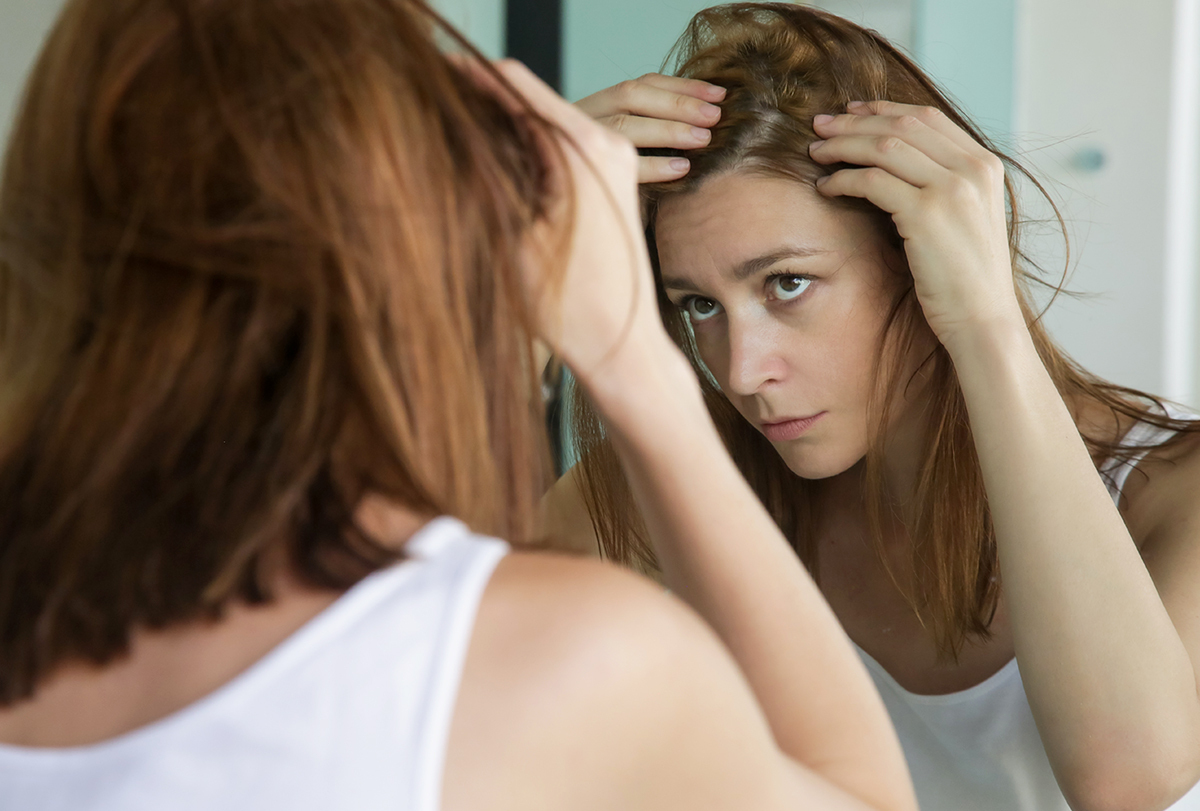
Perspiration is a natural physiological process that allows the body to get rid of excess heat and normalize its core temperature. However, some people have overactive sweat glands that lead to excessive perspiration, which can be quite a nuisance.
This article will discuss how sweat accumulation on the scalp can trigger hair fall, while also discussing ways to prevent it.
The scalp is covered with dense hair growth that does not allow proper ventilation, thereby making it quite warm and sweaty. A sweaty scalp is prone to hair loss due to several reasons:
- The hot and humid environment of the scalp forms the perfect environment for the growth of microbes.
- Sweat also traps dead skin cells and dirt that provide fodder to these microbes, allowing them to proliferate rapidly and cause scalp infections. These infections make your scalp itchy and irritated.
- Plus, sweat contains natural salt, which further promotes fungal growth.
- Increased sweat also stimulates increased secretion of oil from the sebaceous glands, which encourages the growth of the fungus Malassezia furfur. This fungus increases seborrhea (or dandruff), which leads to weakening of the hair roots and, thus, hair breakage.
- Increased sweat and dandruff lead to increased itching and further damage to the hair roots. These effects lead to hair fall and slower hair regrowth.
- Also, the excess sweat that builds up on the scalp can clog the hair follicles and consequently impede hair growth.
Is Scalp Sweating Responsible for Dandruff-Related Hair Fall?
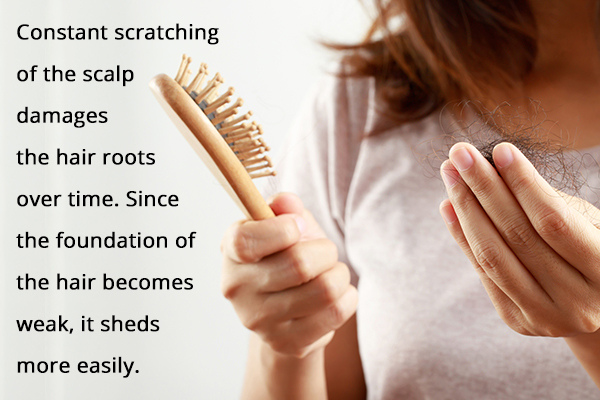
A sweaty scalp is warm and humid, which is the perfect breeding environment for dandruff-causing fungi. This fungal infection leads to scalp inflammation, which results in itching, irritation, and flaking, all of which are characteristic symptoms of dandruff.
Plus, the natural salt found in sweat also settles on the scalp and makes it even more itchy and irritated. The constant scratching that follows thereafter damages the hair roots over time. Since the foundation of the hair becomes weak, it sheds more easily.
Ways to Reduce Scalp Sweating
Prevent your scalp from sweating profusely and hair damage by following these useful tips:
1. Keep your scalp properly ventilated
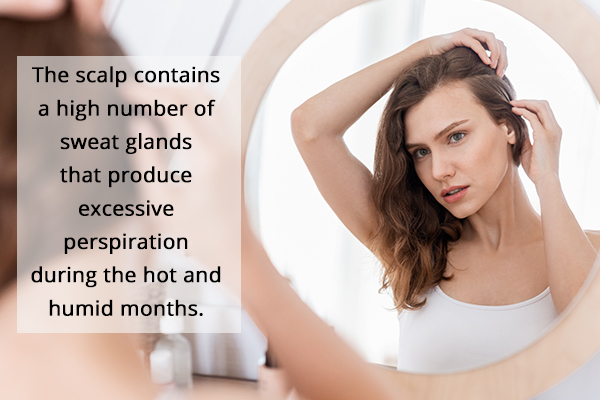
The scalp heats up quickly due to the thick hair growth over it. This excess heat is then released in the form of sweating. Plus, the scalp contains a high number of sweat glands that produce excessive perspiration during the hot and humid months.
Due to the hair cover, your scalp does not receive proper airflow, making it even more hot and sweaty. Wearing a cap, hat, or tight scarf over your head can further block ventilation, trap heat, and thereby induce more sweating.
For these reasons, you are recommended to go for loose head coverings that allow the passage of air so that your scalp can breathe and cool down while the sweat dries up. Also, go for summer headgear that is made of breathable fabrics such as cotton.
2. Drink plenty of water
Keep your body cool and hydrated by maintaining proper fluid intake. Water helps bring down the excess body heat and thereby reduce sweat production.
3. Manage stress
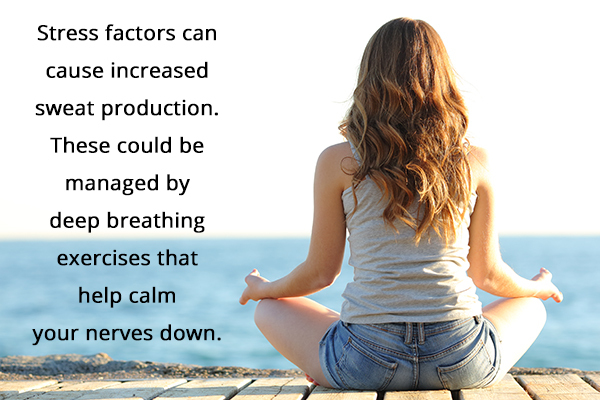
Stress factors such as nervousness, anxiety, panic attacks, and adrenaline rush can cause increased sweat production. These could be managed by deep breathing exercises that help calm your nerves down.
4. Try topical antiperspirants
Topical antiperspirants, when applied to the hair roots, are absorbed into the scalp and block the underlying sweat glands, minimizing perspiration.
However, they can sometimes cause unpleasant side effects such as itching, burning, or more hair fall. So, it is important that you consult a dermatologist before using this product.
5. Modify your diet

A diet rich in unhealthy fats and spices is known to increase body temperature and thereby trigger sweat production. Vegetarian diets, on the other hand, have proven to be more effective for sweat control.
A diet rich in protein such as egg whites, white meat, cottage cheese, tofu, soybean, and pulses can contribute to good hair growth and decrease hair fall.
6. Keep your scalp clean
Wash your hair and scalp regularly with cold or lukewarm water and a gentle shampoo, especially when they become sweaty or greasy.
If possible, wash your scalp immediately after excessive sweating such as after working out, running, or cooking in the kitchen. This is the best way to keep the sweat from building up over time.
However, don’t overdo it since frequent shampooing can further dehydrate and damage the scalp and hair.
7. Massage your scalp
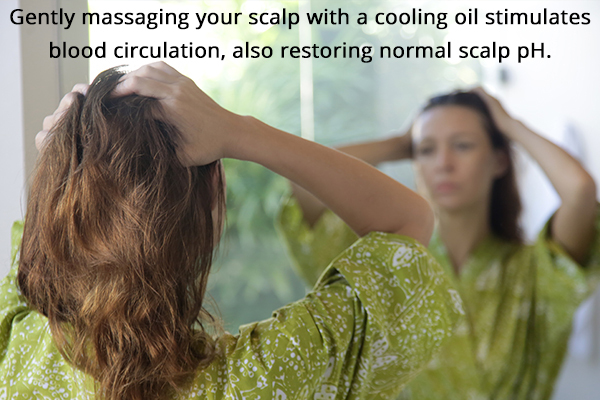
Gently massaging your scalp with a cooling oil stimulates blood circulation under it while also restoring its normal pH. Both these effects lead to reduced scalp perspiration.
8. Cover your head in a sauna
Always cover your head with a shower cap or towel when you sit in a sauna to protect your scalp from the heat, which can otherwise result in excessive sweating.
9. Use DIY hair masks
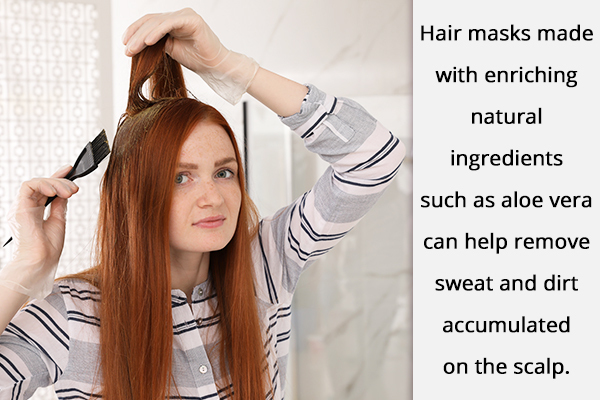
Hair masks made with enriching natural ingredients such as aloe vera can help remove the sweat and dirt accumulated on the scalp.
Plus, these masks provide some much-needed nourishment to the hair follicles. Thus, hair masks help minimize hair fall while promoting new hair growth.
10. See a dermatologist
It is completely normal to lose around 100 hair strands every day, but excessive hair fall can be a cause for concern.
It can sometimes result from an underlying condition that requires medical attention. The hair fall won’t stop until you address its root cause. If the underlying condition is left untreated for long, you can lose significant hair volume and even develop bald patches.
So, it is best to consult a dermatologist as soon as you notice unusual hair shedding for prompt treatment before the hair loss becomes irreversible.
Final Word
While there’s nothing you can do to avoid scalp perspiration altogether, some simple hair care and lifestyle measures can go a long way in controlling the problem. Alternate-day scalp wash is the most important step to get rid of a sweaty, sticky scalp.
Sweaty scalp, in and of itself, is not a cause for concern, but it can pave the way for other scalp problems such as bacterial and fungal infections, which may trigger undue hair fall. The longer you wait to address the condition, the more severe will be the hair loss, which after a point may even become irreversible.
Hair loss is largely considered a cosmetic issue, but it can give you a lot of stress and confidence issues and thereby can hamper your overall quality of life. (2)
- Was this article helpful?
- YES, THANKS!NOT REALLY


